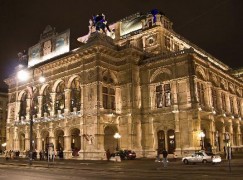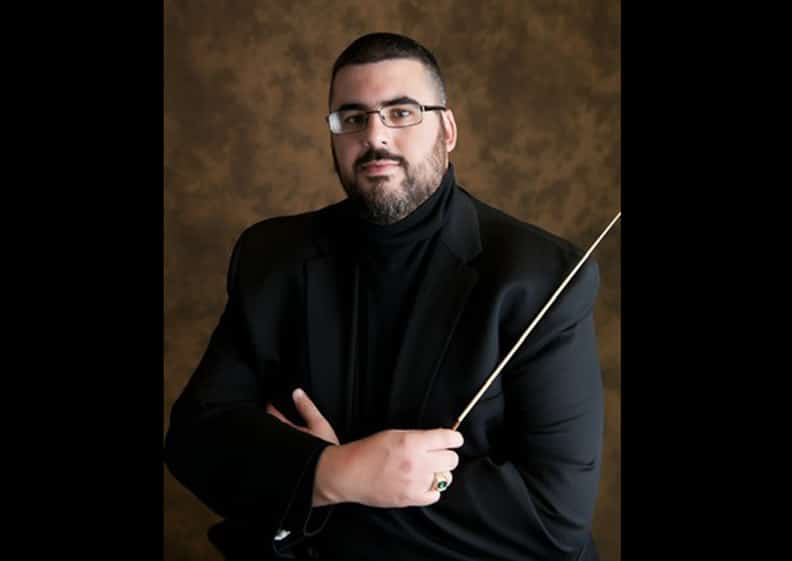Vienna Opera scores 99% attendance
mainAt a press conference to launch the 150th season, general director Dominique Meyer presented a statistic ‘correct up to this morning’ that 99.00 percent of all tickets had been sold throughout the season.
That must be some kind of record.






Lyric Opera of Chicago in the 1980s posted figures just above 100%, to reflect resales. i.e. seats sold twice.
When the new Lincoln Center Met opened, the house was around 99% and in fact Bing considered it oversubscribed for the season making it impossible for out of towners to secure tickets. Though the novelty of the new house had much to do with that, the Met still remained in the healthy 90s for years. But that was long ago now. Could Meyer make it work in today’s New York?
Perhaps if Dominique Meyer had paid as much attention to artistic standards as setting ticket sales records he would not have been fired.
With scandalously reduced rehearsal time and an unconscionable number of substitutions in the orchestra, the Wiener Staatsoper has become little more than a TripAdvisor attraction.
Fully right!!!
I went there to see „we will rock you“. Good stuff. House was full.
Cant wait until they change the seats and put reclining couches with tables for one to order a good Gruner Veltiner, some Sacher Torte and maybe popcorn.
Nice theater 😉
Veltliner
Grüner Veltliner; yes, I brought two bottles back from Vienna in 2011 for my winemaking son. He said it was absolutely beautiful. Just like the Wiener Staatsoper when I went there in September, 2011, to see “Alcina” with Musiciens de Louvre, Minkowski in the pit. First place, as was my little box up top complete with just 4 other chairs, electronic translation and its own little red ante-room for bags and cloaks!! Luxury!
Typo: “first class” not “first place”. It’s been a long day!!
Well, as to “artistic standards”, your case seems focussed on what is going on in the pit. One could also ask questions about who is on stage and who is conducting, but there seems a flaw in your argument.
You say Meyer was “fired” because of “artistic standards”. The people who “fired” him are the same people who have appointed a terminal lightweight in Meyer’s place. What does this new appointee know about standards or how to achieve them? Please enlighten us.
I just received the season plan for the Luzern Opera. They will be doing 8 productions next season, including the usual rep plus an opera using materials from Frank Zappa, and something based on Mahler’s Kindertotenlieder. Luzern has a population of 81,000. The metro area 250,000.
Los Angles with a metro area of about 15 million and the 3rd largest metro GDP in the world usually does about 5 productions a year, as does Seattle, Washington, and Philadelphia. They usual perform each production about 3 or 4 times for a total number of performances equal to what a major European house would do in four to six weeks — and yet that’s their entire season. Even at that, they often have trouble selling their seats. And of course, these dismal conditions are all but a taboo topic in the USA.
Mr. Osborne, wait until the Europeans discover America and durably settle there. Things will get better, I sort of promise!
Please, I’m not in any way defending Los Angeles. As a Nor Cal person, I hate the Dodgers, but they do have the decidedly better concert hall over S.F. However, those 15 million (I think it’s twelve, actually) are spread over several counties and over hundreds of square miles. Getting around is a challenge. L.A. is New York spread outwards instead of upwards. Considering that it was basically built upon a desert (and all the air just gets trapped there!), it’s amazing that it’s as ‘livable’ as it is.
There are numerous distractions in L.A., meaning numerous venues that people can go to, and which compete for people’s spendable income. There are probably numerous small, local opera companies spread about, for those who seek that. But more to the point, there’s lots of theater, lots of sporting events, lots of university events (including music). One of the best orchestras in California is based in Orange County: The Pacific Symphony. I know that Cal State Northridge has all kinds of wonderful music events these days. The Hollywood Bowl has a much improved sound system these days. And on and on it goes. A quick look at the L.A. Times – one of the best online newspapers anywhere – will show you that there is a constant supply of events of every type. There’s absolutely no trouble finding good chamber music in L.A.
Again, I’m not wanting to defend the track record of the L.A. Opera. However, I do believe that at least some of their opera productions are superior to what we often times have in S.F. these days. I know this because I have local friends who go down to L.A. just for the opera. While they’re there, they’ll take in something at one of the numerous, outstanding museums in the area. The Getty Villa out in Pacific Palisades – that alone is wonderful.
I’ve been to Zurich. It’s an incredibly nice town. But comparing Zurich to L.A. is a case of apples and oranges. And I do believe that one could argue that the L.A. Phil. is every bit as good as the Tonhalle Zurich. You also don’t have world class baseball, football (American), ice hockey or basketball in Zurich (sorry, but I’ll never become a fan of soccer, although L.A. has that too). That’s not to mention wrestling, MMA, roller derby or tractor pulls. The point is this: there a million things one can go do in L.A. besides having to drive downtown for the L.A. Opera. Actually, you CAN get there on the underground these days.
I like Zurich very much. In fact, I liked it equally as much as Lucerne (Luzern). But I do think L.A. has a lot going for it, in spite of traffic and smog (avoid the summers).
It’s true that LA is very large and sprawled, but that it actually part of my point. I forget the exact number, but in the Ruhrgebiet of Germany (a huge, highly populated area) there are about 11 full time opera houses within a 50 mile radius.
But let’s not even hope for that. Let’s jus ask why the one opera house that LA has only has the equivalent of about a six week season. We might also ask why San Francisco only has a half year season. Or why the USA ranks 39th in the world for opera performances per capita. And of course, if we had something even better than opera that would be wonderful, but we don’t.
Huh…your argument is very odd. You state that the LA Opera struggles to sell tickets for their existing shows, and then you complain they do not do more shows. Why should they if they can’t sell the tickets? And really, so what if the Viennese like opera while Angelinos prefer to do something else. You really seem to be complaining that other people don’t share your taste.
I love your irony.
“wrestling, MMA, roller derby or tractor pulls” as an equivalent comparison and cultural replacement to opera.
But you say that’s like comparing apples and oranges.
Isn’t it more like comparing apples and turds?
“You also don’t have world class baseball, football (American), ice hockey or basketball in Zurich.”
Haha, who cares. (except a few Americans)
I agree. The point is the amount of ‘other things’ people can and do do in a large metropolitan area such as Los Angeles. Many people in L.A. these days are not from a white, European background. You know that – everybody knows. There are many Latino people, Asian people, Middle Eastern people, etc. European-centric opera simply isn’t part of their cultural upbringing. Furthermore, if you think there needs to be more opera, you have to give them reasons to go and support it, other than it’s good for them. I don’t see that happening.
If you want to say that someplace like L.A. is an armpit because it doesn’t have more opera, then so be it. But there’s certainly no shortage of entertainment, arts, or anything else. As a die-hard Nor Cal person, I find the L.A. basin a fascinating place with tons of things to check out. I’m never bored there.
Many assumptions here about race and culture. One wonders where they come from. Hispanics are one of the pillars of European culture. Latin America is rooted in European culture. Sistema is one manifestation.
We have this notion that being African-American means that they are precluded from the high arts of the culture into which they were born. Politically correct cultural pigeon-holing based on race has become one of the new forms of racism that shapes our views. “Oh, she’s black so she’s got to go into jazz or rap. Take that violin away from her.”
Asians have deeply embraced Western classcial music. Lang Lang et al. See this astounding video of a elementary school band in Japan. There are dozens of such school bands in Japan.
https://www.youtube.com/watch?v=mAfy5e6uXs8
I’m all for developing new forms of high culture beyond orchestras and opera (good riddance,) but the argument that they are irrelevant to Americans based on their race reaches into some misguided and troubling ground. We really need to retire that idea. We tried to open our minds to diversity, it helped a lot, we explored new and rich grounds, but it ended up creating new forms of essentializing and racist thinking as well.
And oddly, this wasn’t even the point I was making. It’s that no matter how we view what are should be supported, we neglect their public support and thus consign them to a market fundamentalism that debases the culture of all Americans.
William, you’re way off base here. True enough, it has nothing to do with their skin color. But many of the immigrants who land in L.A. are not people have had opera in their backgrounds. Some of them? . . . of course. But I think it’s fair to say that the vast, vast majority of folks who are located in – for example – Koreatown, have had little or no real exposure to opera. Think I’m wrong? . . then I would suggest coming to Los Angeles, renting a car and do your own survey. It simply isn’t logical to think that they were opera buffs before they got to L.A., then suddenly dropped it because it’s America and we have MMA and tractor pulls instead. White plight is a fact, and if you’re saying that those missing white people are being replaced by non-white people; well, there’s undoubtedly some truth to that. But it would a very small minority of people from those ethnic groups – even wealthy ones.
If having more opera houses is, somehow, a symbol of ‘culture’ and civility, I’m not going argue against that. The point is this: you have to give people some reason, or some ‘invitation’ to come downtown and spend lots of money at Dorothy Chandler Pavilion. It’s not enough to simply build a house, open the doors and say, “here it is, come and get it”. In Zurich, that may very well work. Viva la difference.
Furthermore, I think they DO have the same sorts of problems in Europe. There’s far more dependency on tax support in Europe than in the U.S. Many institutions in Europe also have trouble putting ‘butts in the seats’. They also have younger people who are also not gravitating to symphony halls and opera houses – just like here. And now, there’s been a spike in immigrants who are just trying to find a better life, and who have had probably zero exposure to European opera. Do you dispute that?
But getting back on point (or closer to it), there are probably many people who take in opera at U.S.C., U.C.L.A., Cal State Northridge, Cal State Irvine, etc., and that’s good enough for them. They may come downtown, WHEN there’s a particular opera or production that they’re attracted to. I would much much rather see any opera house put on five or six productions that are REALLY good, than 15 or 20 that are mediocre. But as you well know, it’s difficult enough to make those five or six productions half-way decent, much less truly great. Opera is a very expensive enterprise.
As for Vienna, Wien bleibt Wien. I’m happy that they’re getting the attendance they seek. Good for them.
As an L.A. native, I can confirm that Barry’s analysis is right on the money. Also, nothing he said was “essentializing” or racist in any way. He wasn’t making some kind of juridical pronouncement that non-Europeans don’t, can’t or shouldn’t enjoy Western classical music. If anything, he was simply stating the obvious: that opera (and “high culture” in general) have to compete with a vast array of other art forms for the patronage of SoCal’s extremely diverse population, for many of whom opera carries basically elitist associations (if it carries any at all). What is absurd (and utterly counterproductive) is to dismiss the existence of other rich and valid modes of cultural expression besides “high art” in the European tradition. Such elitist attitudes, even when preached in opposition to the “market fundamentalism” of the Kulturindustrie, will spell the death of opera.
Actually, these arguments are based on a false assumption that there are so few culturally sophisticated or educated people among the 12 million residents of the area, that the city can only have one full time orchestra, and an opera company with only the equivalent of about a 6 week season. To look at the real situation, simply look at the large number of excellent universities and colleges in the LA area, and their huge student bodies whose graduates shape the larger demographic. I list some below. Some are bit outside the metro area, but many of their grads live in LA. And as for all the other offerings in pop and commerical and specious accusations of snobbery, that hackneyed pomo argument is getting as hoarse as it is deluded. There are fundamental differences between the genres, and their economic support systems in society, that must be recognized regardless of what status we give them.
Antioch University Los Angeles
Claremont Colleges
Claremont McKenna College
Harvey Mudd College
Pitzer College
Pomona College
Scripps College
Loyola Marymount University
Occidental College
Soka University of America
Thomas Aquinas College
University of Redlands
University of the West
Westmont College
Whittier College
Woodbury University
University of California, Irvine
University of California, Los Angeles
University of California, Merced
University of California, Riverside
University of California, San Diego
University of California, Santa Barbara
California State University
California State University
California State University, Bakersfield
California Polytechnic State University, San Luis Obispo
California State Polytechnic University, Pomona
California State University, Channel Islands
California State University, Dominguez Hills
California State University, Fullerton
California State University, Long Beach
California State University, Los Angeles
California State University, Northridge
California State University, San Bernardino
California State University, San Marcos
California State University, San Diego
Private colleges and universities
American Jewish University
Anaheim University
Antioch University Los Angeles
Argosy University
Azusa Pacific University
Biola University
California Institute of Technology
California Institute of the Arts
Now tell me about all those ignorant Angelinos in overalls and straw hats smoking corn cob pipes and playing the banjo who don’t need no damned opry’s.
The point is precisely that we’re not talking about ignorant bumpkins! *Your* assumption, not mine, is that anyone “culturally sophisticated or educated” ought to be lining up for an opera ticket. My experience tells me that there are many, many such people—college-educated, well-read, aesthetically literate—that are interested in other types of culture (!!!) than opera and the Western musical tradition that it represents. Make no mistake: I’m not equating the “seriousness” of classical music with the frivolity and commercialism of mass-market popular music or Hollywood blockbusters or professional sports (though even in those domains there are pockets of authentic culture to be found). I’m also *not* arguing that such overtly commercial pursuits should be equated with (or justified on the same terms as) art forms like theater or dance or spoken word or opera. Nevertheless, the former are, no matter how you feel about them, in direct competition with the latter for the minds and wallets of intelligent, cultured people. Moreover, there are a myriad of other subcultures besides Western opera that arguably hold greater appeal for cultured young people: cinema, contemporary visual art, literature, manga etc. In short, what I’m arguing is that you are massively underestimating the sheer scope of culture (both commercial and otherwise) by insisting on a frankly archaic distinction between “the sort of person” that goes to the opera and the illiterate poor. These days, the traditional categories of high and low, commercial and non-commercial are being brought into unprecedented contact. The result: opera is now just one out of a great many forms of culture competing for patronage—and hardly the most progressive or welcoming to outsiders.
Also, the question of whether opera is or isn’t inherently “elitist” is almost completely beside the point. What matters for the fate of the art form is that it is widely perceived to be that way. And indeed, when you consider the overwhelmingly white, affluent, and retirement-age audience that a typical performance at the Dorothy Chandler attracts, it really is no wonder that opera is regarded by so many outsiders as an avocation of the 1%.
Also, to Barry’s point, a lot of those institutions you just rattled off actually serve their local communities as spaces for the visual and performing arts: some (such as the ones singled out in Barry’s last post) operating at a remarkably high standard of quality.
The argument is again based on a false assumption: “Nevertheless, the former [pop and commercial music] are, no matter how you feel about them, in direct competition with the latter [opera] for the minds and wallets of intelligent, cultured people.”
Opera is not in competition with them. With LA only having a 6 week season, opera hardly enters the market, much less competes. (And of course, the smattering of slap-dash independent productions around town doesn’t change the situation.) And without a substantial opera season, educational and outreach activities are all but non-existent.
Europeans fill their houses because they’ve made long-term investments in classical music education and infrastructure. The USA hasn’t, so our classical offerings are very limited. We thus turn to commercial music and movies as you note. And of course, we cook up rather superficial aesthetic ideologies to rationalize the situation.
London, Paris, and Berlin have fabulous altnerative, pop, jazz, and commercial music cultures. And yet London has 5 full time symphony orchestras and two full time opera houses. Berlin has 6 full time orchestras and three full time opera houses. Paris has 8 full time orchestras, and two full time opera houses. In societies with effective systems of supporting non-commercial music, people have a choice about what they want to consume. The USA doesn’t offer that option. It’s the market or almost nothing.
I agree entirely with your point about music education and the much more sustained commitment to it that many European countries have made. Nevertheless, it is wrong to attribute the comparatively marginal status of opera in this country entirely to commercial philistinism. It is also closely related to the fact that those countries you named (France, Germany, the U.K.) were (a) the very progenitors of the Western classical music tradition and (b) have historically (even in some degree to the present day) had a much more culturally, racially, ethnically, ideologically homogeneous elite class for whom opera was a central element of their national identity and thus something that was felt to demand patronage. From its very outset, the U.S. has been a hodgepodge of classes and cultures—some outright hostile to opera, such as the ultra-Calvinist Puritans, others merely indifferent or unexposed to it. That tradition is not unequivocally a negative thing: it has born remarkable fruit spanning the range of high and low culture. I still say you are wrong to hold that contemporary culture is either opera (and its like) or nothing at all (commercial garbage). There is a rich and ever-expanding third domain whose very health is reflected, paradoxically, in its continuous exploitation and debasement by the Culture Industry. I’m afraid I don’t have time to argue the point further, however, and must take my leave for the time being.
And as a Nor Cal native, I salute our So Cal brethren. I grew up hating L.A. because of the Dodgers, Chavez Ravine and the smog. Then in my ’50s (better late than never) I discovered everything else about the L.A. basin. The smog has been somewhat tamed and the Dodgers have truly turned tame. I now greatly enjoy my trips down there – there’s just a ton of things to do and see. I love film noir and many of those crime stories are L.A. based (but could be anywhere). Most surprising to me, I’ve learned that the majority of people in the L.A. basin are nowhere as cold and hardened as many of we ‘northerners’ are. I realize now that we must seem incredibly obnoxious to Dodger fans. May that part of us never change!